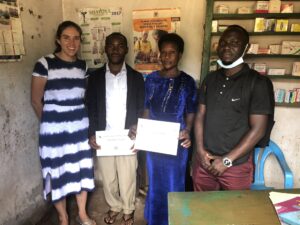Victoria Shelus studies antimalarial drug use and practice at drug shops in Uganda, building on the work of Dr. Ross Boyce.

In the remote villages of Bugoye sub-county at the foot of Uganda’s Rwenzori Mountains a rolling landscape stretches across lush river valleys and steep hillsides. It’s the kind of terrain that might make for a beautiful and strenuous weekend hike for visitors but not necessarily for the people who live there. Residents of this region walk up and down the steep mountainsides throughout their days, at times descending over 1,000 feet to collect water in valley rivers and streams. A visit to the closest clinic or health center can be an arduous journey. This is also malaria country.
“To get to a health center, you may have to hike down a mountain, then take a motorcycle, then walk, perhaps for hours, depending on where you’re coming from,” said Victoria Shelus, PhD, who conducted her dissertation research as a Fulbright-Fogarty Fellow last year through a partnership between Mbarara University of Science and Technology(MUST) and UNC-Chapel Hill.